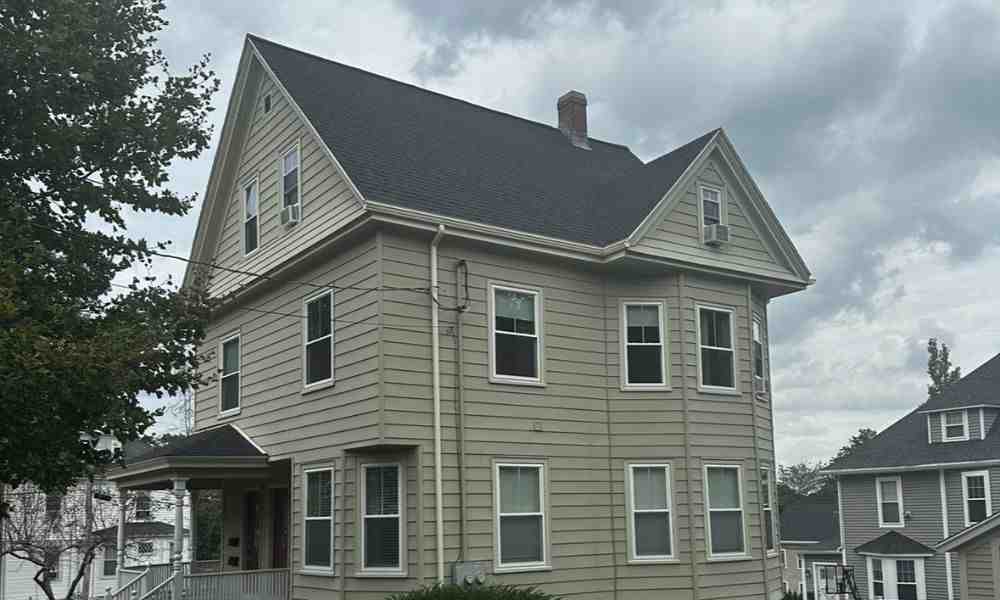How Long Does a Residential Roof Last? Top Answers 2024
How long does a residential roof last? This question is crucial for homeowners everywhere. Here’s a quick snapshot of various roofing materials and their average lifespans:
- Asphalt Shingles: 15-30 years
- Metal Roofs: Up to 70 years
- Clay Tile Roofs: Around 50 years
- Slate Roofs: 100 years or more
- Wood Shingles: Up to 30 years
Your roof is more than just the top of your house; it’s a shield that protects you from the elements. Investing in a durable roof is essential to ensuring long-term protection against harsh weather and other potential damages. High-quality materials coupled with expert craftsmanship can significantly extend the life of your roof and, consequently, the safety and value of your home.
I’m Jack Golini, owner of Golini Roofing with over 35 years of experience. Understanding how long does a residential roof last is fundamental to our approach in providing reliable and high-quality roofing solutions for homeowners like you.

Factors Affecting Roof Durability
When considering how long does a residential roof last, several factors come into play. Understanding these can help you make informed decisions and extend the lifespan of your roof.
Material Type
The type of material you choose for your roof is crucial. Here are some common materials and their average lifespans:
- Asphalt Shingles: Generally last 20-30 years. Three-tab shingles are on the lower end, while architectural shingles can last longer.
- Metal Roofs: Known for their durability, they can last between 40-80 years. Materials like aluminum, steel, and copper offer different benefits.
- Tile Roofs: Clay and concrete tiles can last over 50 years, with slate tiles lasting up to 100 years or more.
- Wood Shingles: Typically last 25-30 years, but proper maintenance is key.
- Flat Roofs: Materials like EPDM, PVC, and TPO have lifespans ranging from 15-25 years.
Installation Quality
Even the best materials won’t perform well if they’re not installed correctly. Poor installation can lead to issues like leaks, sagging, and premature wear. Always hire licensed professionals with good reviews. For instance, Golini Roofing ensures high-quality workmanship, which is vital for a long-lasting roof.
Underlayment
Underlayment is a waterproof layer beneath your roofing material. It acts as a secondary barrier against moisture. High-quality underlayment can prevent mold and rot, significantly extending your roof’s life.
Weather Conditions
Climate and weather conditions heavily impact roof durability. In regions with extreme weather, like the Midwest, roofs face challenges like:
- Temperature Fluctuations: Can cause materials to expand and contract, leading to cracks.
- Storms: Wind, hail, and tornadoes can cause physical damage and moisture buildup.
- Sun Exposure: Prolonged sun exposure can degrade materials faster, especially darker shingles.
Roof Slope
The slope or pitch of your roof affects drainage and exposure to elements. Steeper roofs may shed water and snow more effectively but can be more vulnerable to wind damage. Flat and low-slope roofs need careful monitoring for water accumulation to prevent leaks and mold.
Ventilation
Proper ventilation helps maintain a consistent temperature, reducing the risk of material cracking and moisture buildup. Signs of poor ventilation include:
- Condensation: Inside the attic.
- Ice Dams: Forming on the roof’s edge.
- Hot Spots: Uneven temperature distribution.
Maintenance
Regular maintenance is essential for extending your roof’s lifespan. This includes:
- Annual Inspections: Identifying and fixing small issues before they become major problems.
- Gutter Cleaning: Prevents water buildup and damage.
- Trimming Branches: Avoids branches rubbing against the roof and causing damage.
- Prompt Repairs: Address issues like missing shingles or leaks immediately.
By understanding these factors, you can take proactive steps to ensure your roof lasts as long as possible, providing reliable protection and value for your home.
Next, we’ll dive deeper into the lifespan of different roofing materials, from shingles to metal roofs.
How Long Does a Residential Roof Last?
When it comes to understanding how long does a residential roof last, the answer varies based on the type of material, quality of installation, and maintenance. Let’s break it down by the most common types of roofing materials.
Asphalt Shingles
Asphalt shingles are the most common roofing material for homes. They come in several types, each with its own lifespan:
- Three-Tab Shingles: These are the most budget-friendly but have the shortest lifespan, lasting about 15 to 20 years. They offer less wind resistance and are made from less durable materials.
- Architectural Shingles: These are thicker and more durable, often lasting between 25 to 30 years. They provide a layered look and come in various colors.
- Organic Shingles: Made from recycled materials, these are less common but can last around 20 years.
- Composite Shingles: Mimicking the look of wood or slate, composite shingles are made from polymer, rubber, or plastic. They are more durable than wood and can last 40 to 50 years.
Metal Roofs
Metal roofs are gaining popularity due to their durability and long lifespan. The lifespan can vary based on the type of metal and its thickness (gauge):
- Aluminum: Softer and thinner, aluminum roofs typically last 20 to 25 years.
- Steel: More durable, especially with a thicker gauge (22-24), steel roofs can last 50 years or more.
- Copper: The most durable and expensive, copper roofs can last up to 80 years.
Tile Roofs
Tile roofs are another long-lasting option, often seen in warmer climates:
- Clay Tiles: These can last up to 100 years and are excellent at reflecting sunlight, keeping homes cooler.
- Concrete Tiles: Similar to clay but less expensive, concrete tiles also last around 50 years or more.
- Slate Tiles: The most durable of all, slate tiles can last up to 150 years. They are heavy and require a strong structure to support them.
Wood Shingles
Wood shingles offer a natural and rustic look but require more maintenance:
- Cedar, Spruce, and Pine: These materials can last up to 30 years with proper care. Cedar is particularly resistant to insects and rot, making it a popular choice.
Flat Roofs
Flat roofs are common in commercial buildings but can also be found in residential settings. The lifespan varies based on the material used:
- EPDM: A synthetic rubber material that lasts 25 to 30 years with proper maintenance.
- PVC: A vinyl membrane that is UV resistant and energy-efficient, lasting over 20 years.
- TPO: Thermoplastic Polyolefin is less flexible than PVC but more affordable, lasting 15 to 20 years.
- Spray Foam: This option provides excellent insulation and can last up to 20 years with proper maintenance.
By understanding the lifespan and characteristics of these materials, homeowners can make informed decisions about their roofing needs. Next, we’ll discuss how to extend the lifespan of your roof.
How to Extend the Lifespan of Your Roof
Extending the lifespan of your roof doesn’t have to be complicated. Simple, regular maintenance can go a long way. Here are some key steps to keep your roof in top shape:
Regular Maintenance
Regular maintenance is crucial. Without it, small problems can quickly turn into big, expensive ones. Regular checks help catch issues early, which can save you a lot of money in the long run.
Annual Inspections
Schedule annual inspections with a professional roofing contractor. This ensures that any minor issues are identified and fixed before they become major problems. An inspection can reveal hidden damage, such as leaks or deteriorating shingles, that you might not notice yourself.
Gutter Cleaning
Gutters play a vital role in protecting your roof. Clogged gutters can cause water to back up and seep under your roof, leading to leaks and water damage. Clean your gutters at least twice a year, especially after the fall when leaves can accumulate.
Trimming Branches
Overhanging branches can cause significant damage to your roof. They can scrape against the shingles, leading to wear and tear, or even break and fall during storms. Trim any branches that hang over your roof to prevent these issues.
Addressing Issues Promptly
If you notice any damage, such as missing shingles or leaks, address it immediately. Ignoring these problems can lead to more severe damage and costly repairs. Early intervention can save you time, money, and stress.
By following these simple steps, you can significantly extend the life of your roof and protect your home from the elements. Up next, we’ll tackle some frequently asked questions about the lifespan of residential roofs.
Frequently Asked Questions about Residential Roof Lifespan
How long should a shingle roof last?
The lifespan of a shingle roof largely depends on the type of shingles used. Three-tab asphalt shingles, which are common and budget-friendly, generally last 15 to 20 years. However, they offer less protection against wind and weather.
Architectural asphalt shingles are a better option if you’re looking for durability. These shingles can last 30 to 50 years, depending on the quality and maintenance. They are more robust and give homes a layered, textured look.
Composite shingles, which mimic the appearance of wood or slate, are another durable choice. They can last 40 to over 50 years and offer better protection against heat, hail, and fire.
Do 30-year shingles really last 30 years?
30-year shingles can last 30 years, but consider factors like installation quality, weather conditions, and maintenance. Proper installation and regular upkeep can help these shingles reach their full lifespan.
However, stressors like extreme weather, sun exposure, and improper roof pitch can shorten their life. Realistically, you might expect to get around 80-85% of the stated lifespan, which means 24 to 26 years for 30-year shingles.
What is the average lifespan of a house roof?
The average lifespan of a residential roof varies based on the materials used. Here’s a quick rundown:
- Asphalt shingles: 20 to 30 years
- Metal roofs: 50 to 80 years
- Wood shingles: Up to 30 years
- Slate tiles: 50 to 100 years
- Concrete or clay tiles: 50 years or more
Regular maintenance and quality installation play a significant role in achieving these lifespans. For instance, cleaning gutters and trimming overhanging branches can prevent damage and extend your roof’s life.
Next, let’s dive into some tips on how to extend the lifespan of your roof.
Conclusion
To sum up, how long does a residential roof last? It depends on several factors, including the type of material, quality of installation, and regular maintenance. Here’s a quick recap:
- Asphalt shingles: 20 to 30 years
- Metal roofs: 50 to 80 years
- Wood shingles: Up to 30 years
- Slate tiles: 50 to 100 years
- Concrete or clay tiles: 50 years or more
Regular maintenance, like cleaning gutters and trimming branches, is essential for achieving these lifespans.
Importance of Professional Installation
The quality of your roof installation is crucial. Poor workmanship can lead to costly repairs and a shorter roof lifespan. Choosing a reputable contractor ensures your roof is installed correctly and efficiently. At Golini Roofing, we pride ourselves on our attention to detail and high-quality workmanship.
Why Choose Golini Roofing?
With decades of experience, Golini Roofing offers top-notch residential roofing services tailored to your needs. We provide a range of services, including roof replacements, repairs, and maintenance. Our team uses high-quality materials to ensure your roof stands the test of time.
Ready to invest in a durable roof? Contact Golini Roofing for a free consultation and estimate. Let us help you protect your home with a roof that lasts.
Contact us today! Call us at 781-246-0141 or visit our contact page.
Choose Golini Roofing—the name synonymous with excellence, quality, and the best roofing solutions.


